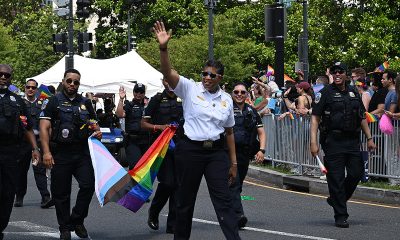Florida
Florida prosecutor drops sex with minor charges against Brett Parson
Memo says youth declined to participate in case
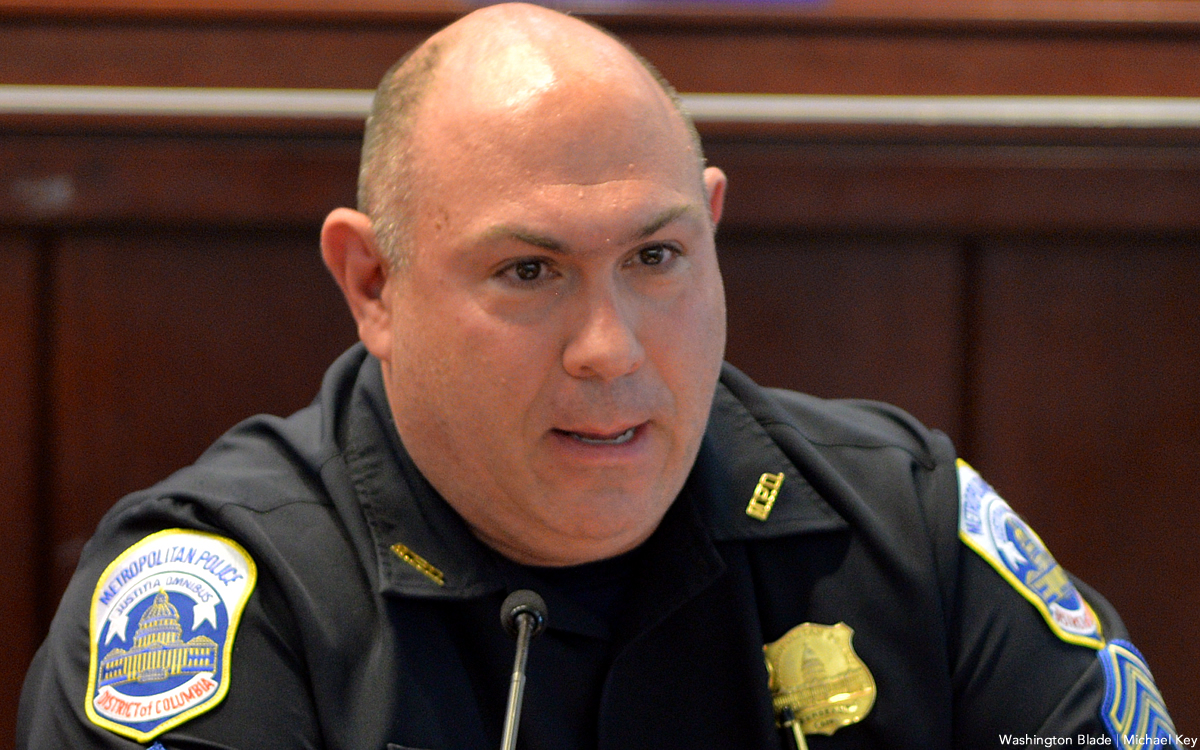
A prosecutor with the Broward County, Fla., State Attorney on Monday dropped two charges of unlawful sexual activity with a minor filed against former D.C. police lieutenant Brett Parson by Boca Raton, Fla. police in February 2022.
A spokesperson for the State Attorney’s office told the Washington Blade the charges were dropped at an 8:30 a.m. hearing before a judge at the Broward County Circuit Court in Fort Lauderdale on Monday, March 13.
In a three-page Closeout Memorandum released by the Broward State Attorney’s Office, Assistant State Attorneys Neva Rainford-Smith and Damette Lennox state that prosecutors decided to drop the charges after it became clear that the then 16-year-old boy, who told authorities that his sexual encounter with Parson was consensual, did not want to participate in the prosecution against Parson.
An arrest affidavit filed by Coconut Creek, Fla., police at the time of Parson’s arrest on Feb. 18, 2022, says Parson allegedly had a consenting sexual encounter with a 16-year-old boy who told police he met Parson on the gay online dating app Growlr and agreed to meet for a sexual encounter after the two exchanged “explicit” photos of each other.
The age of sexual consent in Florida is 18, which made it illegal for Parson to engage in sex with the youth, even though the age of consent in several other states, including D.C., is 16.
Charging documents say the youth and Parson agreed to meet at a gas station in Coconut Creek near where the youth lived. The documents say both arrived in separate cars and, at the suggestion of the youth, drove separately to another location at a secluded parking lot at about 1 a.m., where they engaged in sex in the car Parson had been driving.
Police became involved, according to the charging documents, after the youth noticed people were walking near where they were parked and asked that they drive to yet another location. With Parson following the youth as the two drove in their separate cars, the youth drove into a restricted location. Police stopped both cars, the charging documents say.
One of the officers allowed Parson to drive away after Parson said he was lost and did not know the person in the other car. But for as yet unexplained reasons, the youth, when questioned by a police officer, provided full details of his involvement with Parson, which enabled police to locate Parson through text messages between the youth and Parson that police obtained from the youth’s cell phone.
“The defendant was a 53-year-old man who was in Broward County visiting family after one of his parents had surgery,” the memorandum released by prosecutors says. “The defendant and the victim, a then 16-year-old boy, met on Growlr, which is a gay dating application,” the memo continues.
“It should be noted that in order to have an account with Growlr, the user must be 18 years of age or older,” the memo says. “This victim’s profile listed him as 19 years of age,” the memo states.
The memo says the youth told police at the time they stopped him that Parson “never forced him or threatened him” and that while at times he was uncomfortable, “he never showed signs of wanting to stop or never told the defendant to stop.” It says the youth’s parents, who charging documents say were called by police to the scene where the youth was stopped, told police their son did not want to talk about what happened “but was starting to realize what happened was wrong.”
The charging documents state that at the request of the parents, police and prosecutors filed the two charges of unlawful sexual activity with a minor against Parson. But the memorandum released by the State Attorney’s office on March 13 at the time the charges were dropped in court states that in the months following Parson’s arrest, the youth and his parents were reluctant to speak with a victim advocate to arrange for interviews needed to go forward with the case.
“She left multiple voicemails in early April of 2022 and did not receive a call back,” the memo says. It says between then and February of this year, the youth’s parents continued to decline to make the youth available for an in-person interview needed if the case against Parson was to continue.
“Myself and [the youth’s mother] wanted to move forward, but do not want to put him through this against his will,” the memo quotes the youth’s father as saying in an email to one of the assistant prosecutors, according to the memo. “If there is a way to proceed without his involvement, we would like to. But if this requires his involvement, then we prefer to drop the case,” the memo quotes the father as saying.
“Obviously, even though lack of knowledge of age or misrepresentation of age is not a defense to the crime charged, the defendant’s position has always been that he believed the victim was a 19-year-old man, which is what the victim had listed as his age in the dating application,” the memo continues.
“Due to lack of victim cooperation, my conversations with the victim’s parents and the potential scheduling of a deposition of the victim, the State believed it was in the best interest of the victim to not require him to come in for deposition and subsequent trial testimony, to respect his wishes and announce a nollo prosequi in the case,” Assistant State Attorney in Charge Neva Rainford-Smith concludes in the memo.
The term “nollo prosequi” is a Latin phrase used in criminal law for a decision not to prosecute a case.
Parson has declined to speak with the media since the time of his arrest.
Florida
Federal judge blocks Fla. trans health care ban and restrictions
Republican Gov. Ron DeSantis plans to appeal ruling
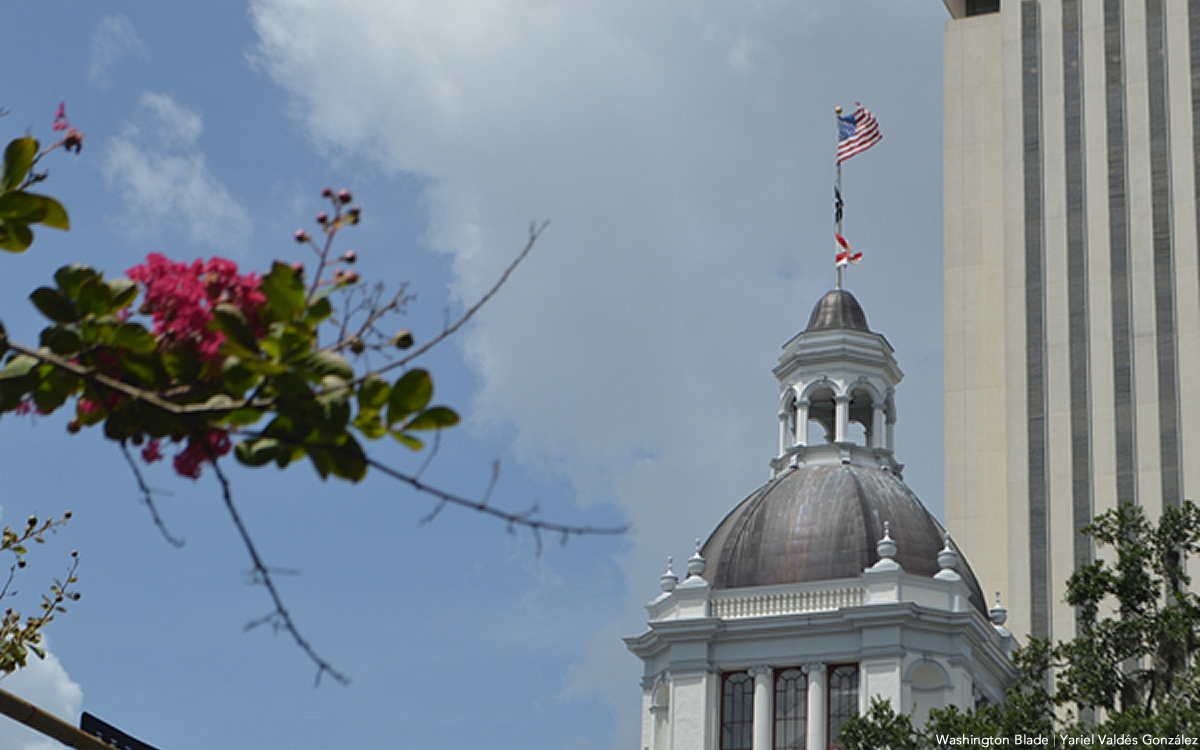
BY JACKIE LLANOS | Florida’s ban on puberty blockers and hormone replacement therapy for transgender minors and restrictions for adults are both unconstitutional, a federal judge ruled Tuesday.
U.S. District Judge Robert Hinkle, who presided over the case in Tallahassee, sided with the plaintiffs in the class action — parents of trans minors and trans adults — who argued the measure violated the U.S. Constitution because it solely targeted trans people.
“The federal courts have a role to play in upholding the constitution and laws. The state of Florida can regulate as needed but cannot flatly deny transgender individuals safe and effective medical treatment — treatment with medications routinely provided to others with the state’s full approval so long as the purpose is not to support the patient’s transgender identity,” Hinkle wrote.
Those restrictions came into place following Gov. Ron DeSantis’ approval of Senate Bill 254 in May 2023 and promulgation of rules from the Florida Board of Medicine and Florida Board of Osteopathic Medicine enacting that law. Those boards and Florida Surgeon General Joseph Ladapo were named as defendants.
The measures banned minors’ use of puberty blockers and hormone replacement therapy, common treatments for gender dysphoria. Additionally, the law said only physicians, psychologists, and psychiatrists could treat adults seeking gender-affirming care, with the added requirements of frequent in-person visits, tests, and authorization through a consent form that contained false information about the harms of hormone replacement therapy.
However, the law didn’t impose the same restrictions on cisgender women needing to take testosterone or cisgender men needing to take estrogen.
Appeal incoming
The state plans to appeal the ruling, said Jeremy Redfern, press secretary to DeSantis. An appeal would go to the 11th U.S. Court of Appeals.
“Through their elected representatives, the people of Florida acted to protect children in this state, and the court was wrong to override their wishes,” Redfern wrote in a statement to Florida Phoenix.
“We disagree with the court’s erroneous rulings on the law, on the facts, and on the science. As we’ve seen here in Florida, the United Kingdom, and across Europe, there is no quality evidence to support the chemical and physical mutilation of children. These procedures do permanent, life-altering damage to children, and history will look back on this fad in horror.”
Redfern wrote that the state would continue to “fight to ensure children are not chemically or physically mutilated in the name of radical, new age ‘gender ideology.’”
In his 105-page ruling, Hinkle noted that “there were no complaints from patients, no adverse results in Florida, just a political issue.”
However, the ruling does not lift the state ban on gender-affirming surgery for minors and restrictions on surgery for adults. That’s because the plaintiffs didn’t challenge the statutes relating to surgery for minors, and the adult plaintiff had not sought surgery and so lacked standing to challenge those restrictions.
Relief for plaintiffs
Plaintiff Gloria Goe (they used pseudonyms to protect the privacy of their children) is the mother of an 8-year-old (at the opening of the case) trans boy. During the opening day of the trial on Dec. 13, she testified that she feared her son would be swallowed by depression if forced to go through puberty without medical treatment.
“This ruling lifts a huge weight and worry from me and my family, knowing I can keep getting Gavin the care he needs, and he can keep being the big-hearted, smiling kid he is now. I’m so grateful the court saw how this law prevented parents like me from taking care of our children,” Goe wrote in a press release.
Attorneys with GLBTQ Legal Advocates and Defenders, Human Rights Campaign Foundation, National Center for Lesbian Rights, Southern Legal Counsel, and the Lowenstein Sandler law firm represented the plaintiffs.
Hinkle compared the discrimination trans people face nowadays to racism and misogyny.
“Some transgender opponents invoke religion to support their position, just as some once invoked religion to support their racism or misogyny,” Hinkle wrote. “Transgender opponents are of course free to hold their beliefs. But they are not free to discriminate against transgender individuals just for being transgender. In time, discrimination against transgender individuals will diminish, just as racism and misogyny have diminished.”
Editor’s note:
In a statement made to the Los Angeles Blade after Tuesday’s rule, Shannon Minter, the legal director for the National Center for Lesbian Rights said:
“This decision is important because is the first federal court to rule on a law restricting healthcare for transgender adults and because it finds that Florida’s laws are plainly based on anti-transgender bias, not science. This victory shows that we can and must keep fighting these dangerous laws, notwithstanding the deeply flawed rulings of some conservative appellate courts.
Judge Hinkle ruled in favor of the transgender plaintiffs in this case even after the negative 11th Circuit ruling that reversed our initially successful challenge to a similar ban in Alabama. He was able to do so because the evidence showing that these laws have no medical justification and are rooted in false stereotypes and bias was so strong. This is a huge victory, and one that shows that we can win these battles even in red states.”
******************************************************************************************

Jackie Llanos is a recent graduate of the University of Richmond. She has interned at Nashville Public Radio, Virginia Public Media, and Virginia Mercury.
******************************************************************************************
The preceding article was previously published by The Florida Phoenix and is republished with permission.
The Phoenix is a nonprofit news site that’s free of advertising and free to readers. We cover state government and politics with a staff of five journalists located at the Florida Press Center in downtown Tallahassee.
We’re part of States Newsroom, the nation’s largest state-focused nonprofit news organization.
Florida
Homeless transgender woman murdered in Miami Beach
Andrea Doria Dos Passos attacked while she slept
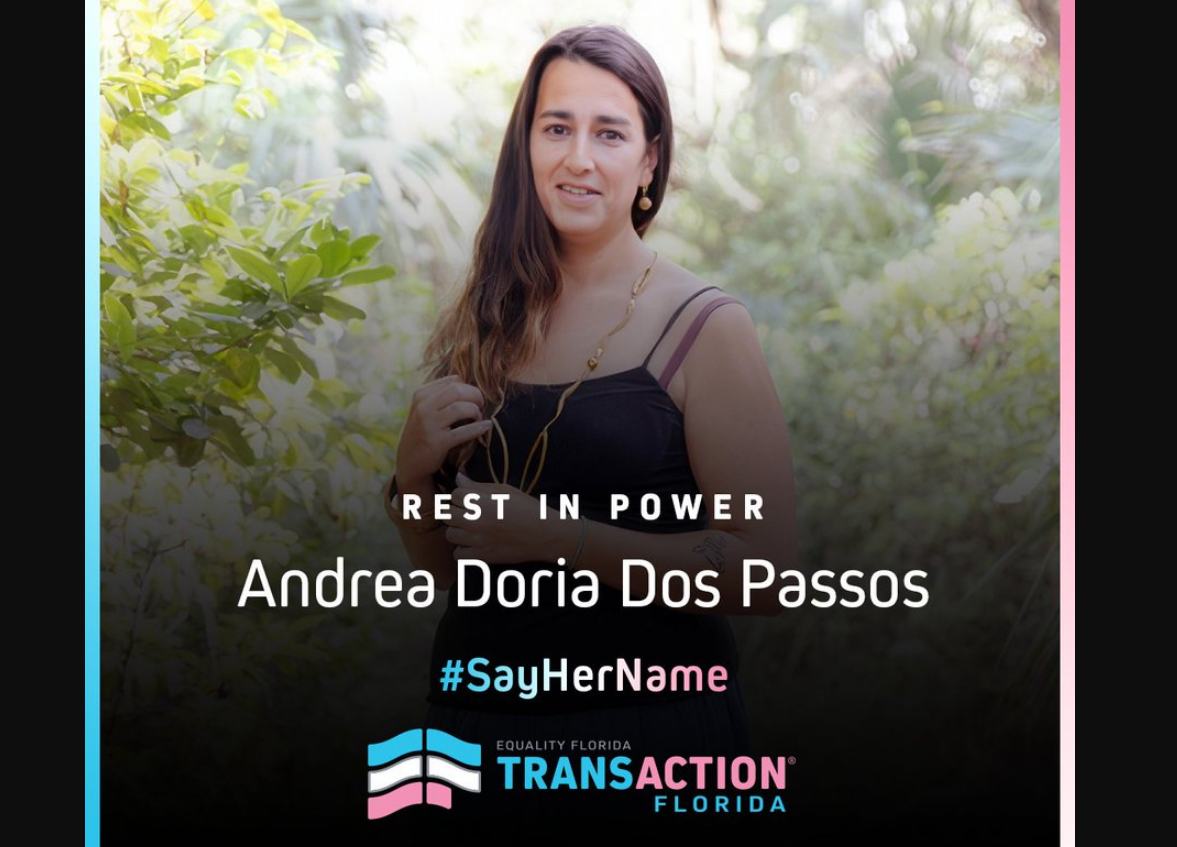
Gregory Fitzgerald Gibert, 53, who was out on probation, is charged with the second-degree murder of 37-year-old Andrea Doria Dos Passos, a transgender Latina woman who was found deceased in front of the Miami Ballet company facility by a security guard this past week.
According to a Miami Beach Police spokesperson the security guard thought Dos Passos was sleeping in the entranceway around 6:45 a.m. on April 23 and when he went to wake her he discovered the blood and her injuries and alerted 911.
She was deceased from massive trauma to her face and head. According to Miami Beach police when video surveillance footage was reviewed, it showed Dos Passos lying down in the entranceway apparently asleep. WFOR reported: In the early morning hours, a man arrived, looked around, and spotted her. Police said the man was dressed in a black shirt, red shorts, and red shoes.
At one point, he walked away, picked up a metal pipe from the ground, and then returned. After looking around, he sat on a bench near Dos Passos. After a while, he got up and repeatedly hit her in the head and face while she was sleeping, according to police.
“The male is then seen standing over her, striking her, and then manipulating her body. The male then walks away and places the pipe inside a nearby trash can (the pipe was found and recovered in the same trash can),” according to the arrest report.
Police noted that in addition to trauma on her face and head, two wooden sticks were lodged in her nostrils and there was a puncture wound in her chest.
Victor Van Gilst, Dos Passos’s stepfather confirmed she was trans and experiencing homelessness.
“She had no chance to defend herself whatsoever. I don’t know if this was a hate crime since she was transgender or if she had some sort of interaction with this person because he might have been homeless as well. The detective could not say if she was attacked because she was transgender,” said Van Gilst.
“She has been struggling with mental health issues for a long time, going back to when she was in her early 20s. We did everything we could to help her. My wife is devastated. For her, this is like a nightmare that turned into reality. Andrea moved around a lot and even lived in California for a while. She was sadly homeless. I feel the system let her down. She was a good person,” he added.
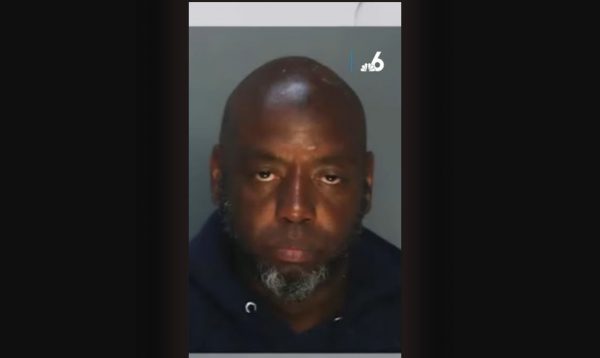
The Miami Police Department arrested Gibert, collected his clothing, noting the red shorts were the same type in the video and had blood on them. Blood was also found on his shoes, according to police. He was taken into custody and charged.
“The suspect has an extensive criminal record and reportedly was recently released from custody on probation for prior criminal charges. Police apprehended the suspect in the city of Miami and the investigation is currently ongoing. This case is further evidence that individuals need to be held accountable for prior violent crimes for the protection of the public. We offer our sincere condolences to the family and friends of the victim,” Miami Beach Mayor Steve Meiner said in a statement.
Joe Saunders, senior political director with LGBTQ rights group Equality Florida, told the Miami Herald that “whenever a transgender person is murdered, especially when it is with such brutality, the question should be asked about whether or not this was a hate-motivated crime.”
Florida
Professor at Baptist university in Virginia found dead in Florida gay sauna
Orlando police say cause of death undetermined

A beloved professor of psychology at Averett University, a private Baptist university in Danville, Va., was found dead on March 16 of unknown causes at the Club Orlando, a popular sauna and bathhouse for gay men located in Orlando, Fla.
University officials said David Hanbury, 37, an Associate Professor of Psychology who taught at the university since 2015, was in Orlando attending a conference of the Southern Psychological Association and had initially been reported missing by family members before he was found deceased.
Orlando police told USA Today the cause of death had not been determined but the death “does not appear suspicious at this time.” USA Today reports that police said their investigation into the death was “active and ongoing.”
A spokesperson for the Orange County, Fla., Medical Examiner told the Washington Blade it would take about 90 days for the completion of blood work and toxicology tests to confirm the cause of death in a case like this, where there were no obvious signs of injury or illness.
Cassie W. Jones, Associate Vice President of University Marketing and Communications at Averett University, declined to disclose whether Hanbury self-identified as gay in response to an inquiry from the Blade
“As an employer, we cannot comment on our employees’ personal matters,” Jones said. But when asked if the university would have continued to treat Hanbury with respect and support his tenure at the university if he had come out as gay, she said “absolutely” in an email response to Blade questions.
“Dr. David Hanbury was a dear professor, colleague and friend whose influence was far reaching,” Jones said in a March 21 message to the Blade, “We send our affection, condolences, and prayers of support to Dr. Hanbury’s family, friends and all others upon whom he had a lasting impact.”
The Averett University website shows that it has a policy of nondiscrimination that includes the categories of sexual orientation and gender identity among other categories such as race, religion, and ethnicity. The website also shows that the university has an LGBTQ student group called the Gender and Sexuality Alliance or GSA group.
Jones said the admiration and longstanding support of Hanbury from his fellow professors and students was reflected in a March 18 memorial gathering for him on campus.
“Nearly 250 students, faculty, staff, and community members joined as one Averett family, united in grief and sorrow, as we gave thanks for the remarkable life and influence of Dr. Hanbury on our lives and on the University,” Jones said.
“Averett University is committed to inclusion and belonging for all who learn, work and visit our campus,” Jone told the Blade. “Openness and inclusivity are embedded in our institution’s core values, and we know our diversity makes us stronger.”
The Baptist Standard, an independent newspaper that reports on the Baptist Church, reported in a May 9, 2011, story that the Baptist General Association of Virginia severed ties with Averett University in 2005 over a disagreement with the university’s position on homosexuality. Other news reports at the time said the Baptist organization objected to the university’s support for a gay student group.
Jones, in her message to the Blade, said Averett University currently “is a part of the Baptist General Association of Virginia family of educational partners.” She added, “We are aligned in our commitment to meet students wherever they are in their faith journey, and welcome those of all faiths or no faith.”
-

 Federal Government2 days ago
Federal Government2 days agoTreasury Department has a gay secretary but LGBTQ staff are under siege
-

 Virginia3 days ago
Virginia3 days agoDefying trends, new LGBTQ center opens in rural Winchester, Va.
-

 District of Columbia2 days ago
District of Columbia2 days agoGay GOP group hosts Ernst, 3 House members — all of whom oppose Equality Act
-

 District of Columbia2 days ago
District of Columbia2 days agoD.C. police seek public’s help in July 5 murder of trans woman

